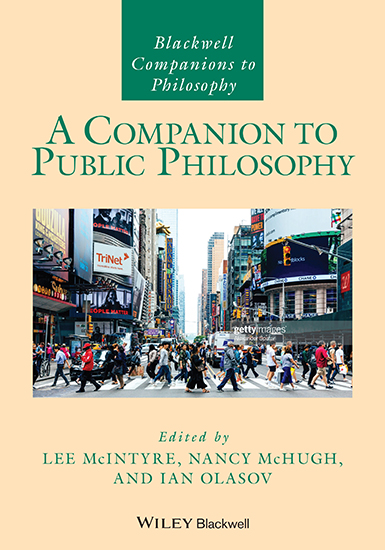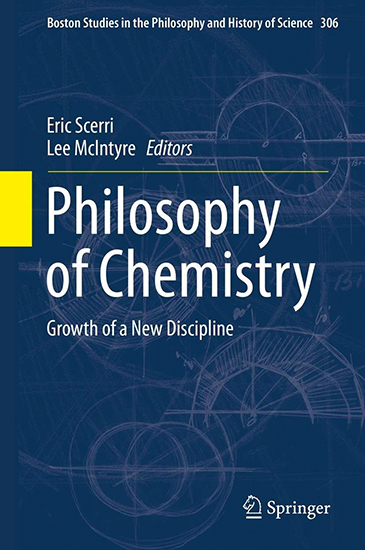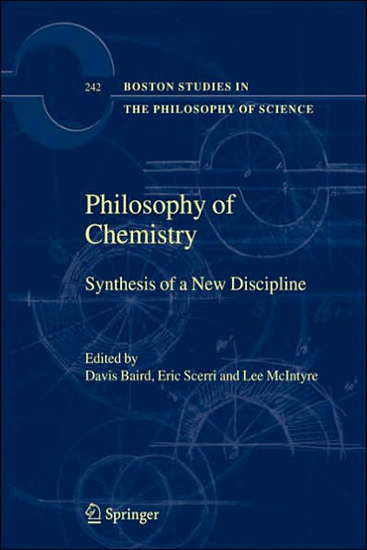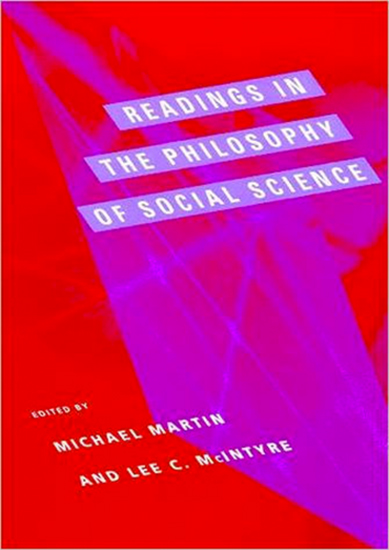Academic Anthologies
A Companion to Public Philosophy
Edited by Lee McIntyre, Nancy McHugh and Ian Olasov
The first anthology devoted to the theory and practice of all forms of public philosophy.
A Companion to Public Philosophy brings together in a single volume the diverse practices, modalities, and perspectives of this rapidly growing field. Forty-two chapters written by established practitioners and newer voices alike consider questions ranging from the definition of public philosophy to the value of public philosophy to both society and philosophy itself. Throughout the book, philosophers offer insights into the different publics they have engaged, the topics they have explored, the methods they have used and the lessons they have learned from these engagements.
The Companion explores important philosophical issues concerning the practice of philosophy in the public sphere, how public philosophy relates to advocacy, philosophical collaborations with political activists, locations where public philosophy can be done, and more. Many essays highlight underserved topics such as effective altruism, fat activism, trans activism, indigenous traditions, and Africana philosophy, while other essays set the stage for rigorous debates about the boundaries of public philosophy and its value as a legitimate way to do philosophy.
- Discusses the range of approaches that professional philosophers can use to engage with non-academic audiences
- Explores the history and impact of public philosophy from the time of Socrates to the modern era
- Highlights the work of public philosophers concerning issues of equity, social justice, environmentalism, and medical ethics
- Covers the modalities used by contemporary public philosophers, including film and television, podcasting, internet memes, and community-engaged teaching
- Includes essays by those who bring philosophy to corporations, government policy, consulting, American prisons, and activist groups across the political spectrum
A Companion to Public Philosophy is essential reading for philosophers from all walks of life who are invested in and curious about the ways that philosophy can impact the public and how the public can impact philosophy. It is also an excellent text for undergraduate and graduate courses on the theory and practice of public philosophy as well as broader courses on philosophy, normative ethics, and comparative and world philosophy.
Routledge Companion to Philosophy of Social Science
Edited by Lee McIntyre and Alex Rosenberg
The Routledge Companion to Philosophy of Social Science is an outstanding guide to the major themes, movements, debates, and topics in the philosophy of social science. It includes thirty-seven newly written chapters, by many of the leading scholars in the field, as well as a comprehensive introduction by the editors. Insofar as possible, the material in this volume is presented in accessible language, with an eye toward undergraduate and graduate students who may be coming to some of this material for the first time. Scholars too will appreciate this clarity, along with the chance to read about the latest advances in the discipline. The Routledge Companion to Philosophy of Social Science is broken up into four parts:
- Historical and Philosophical Context
- Concepts
- Debates
- Individual Sciences
Edited by two of the leading scholars in the discipline, this volume is essential reading for anyone interested in the philosophy of social science, and its many areas of connection and overlap with key debates in the philosophy of science.
Philosophy of Chemistry
Growth of a New Discipline
Edited by Eric Scerri and Lee McIntyre
This volume follows the earlier successful book in the same series, which helped to introduce and spread the Philosophy of Chemistry to a wider audience of philosophers, historians, and science educators, as well as chemists, physicists and biologists. The introduction summarizes the way in which the field has developed in the ten years since the previous volume and introduces several new authors who did not contribute to the earlier book. The editors are well placed to assemble this book, as they are the editor in chief and deputy editors of the leading academic journal in the field, Foundations of Chemistry. The philosophy of chemistry remains a somewhat neglected field, unlike the philosophy of physics and the philosophy of biology. Why there has been little philosophical attention to the central discipline of chemistry among the three natural sciences is a theme that is explored by several of the contributors. This volume will do a great deal to redress this imbalance. Among the themes covered is the question of reduction of chemistry to physics, the reduction of biology to chemistry, whether true chemical laws exist and causality in chemistry. In addition more general questions of the nature of organic chemistry, biochemistry and chemical synthesis are examined by specialist in these areas.
Philosophy of Chemistry
Synthesis of a New Discipline
Edited by Davis Baird, Eric Scerri, and Lee McIntyre
This comprehensive volume marks a new standard in scholarship in the still emerging field of the philosophy of chemistry. With selections drawn from a wide range of scholarly disciplines, philosophers, chemists, and historians of science here converge to ask some of the most fundamental questions about the relationship between philosophy and chemistry. What can chemistry teach us about longstanding disputes in the philosophy of science over such issues as reductionism, autonomy, and supervenience? And what new issues may chemistry bring to the forefront now that it has joined physics and biology as a serious topic for philosophical reflection? This newest addition to the prestigious Boston Studies in the Philosophy of Science series marks the true arrival of philosophy of chemistry within the corpus of the philosophy of science.
Praise
Readings in the Philosophy of Social Science
Edited by Michael Martin and Lee McIntyre
This is the first comprehensive anthology in the philosophy of social science to appear since the late 1960s. Covering all of the major areas in the discipline, it will serve as the standard source for scholarship in the field and could be used as the basis for an entire course.
The anthology offers one complete, convenient, and well-chosen selection of readings, plus three specially commissioned articles that encompass the entire range of topics in the field and cover both sides of currently hot debates about explanation, methodological individualism, and the special sciences. The introductions to each section provide a map through the discipline.
Sign up for Lee's Newsletter: Subscribe






